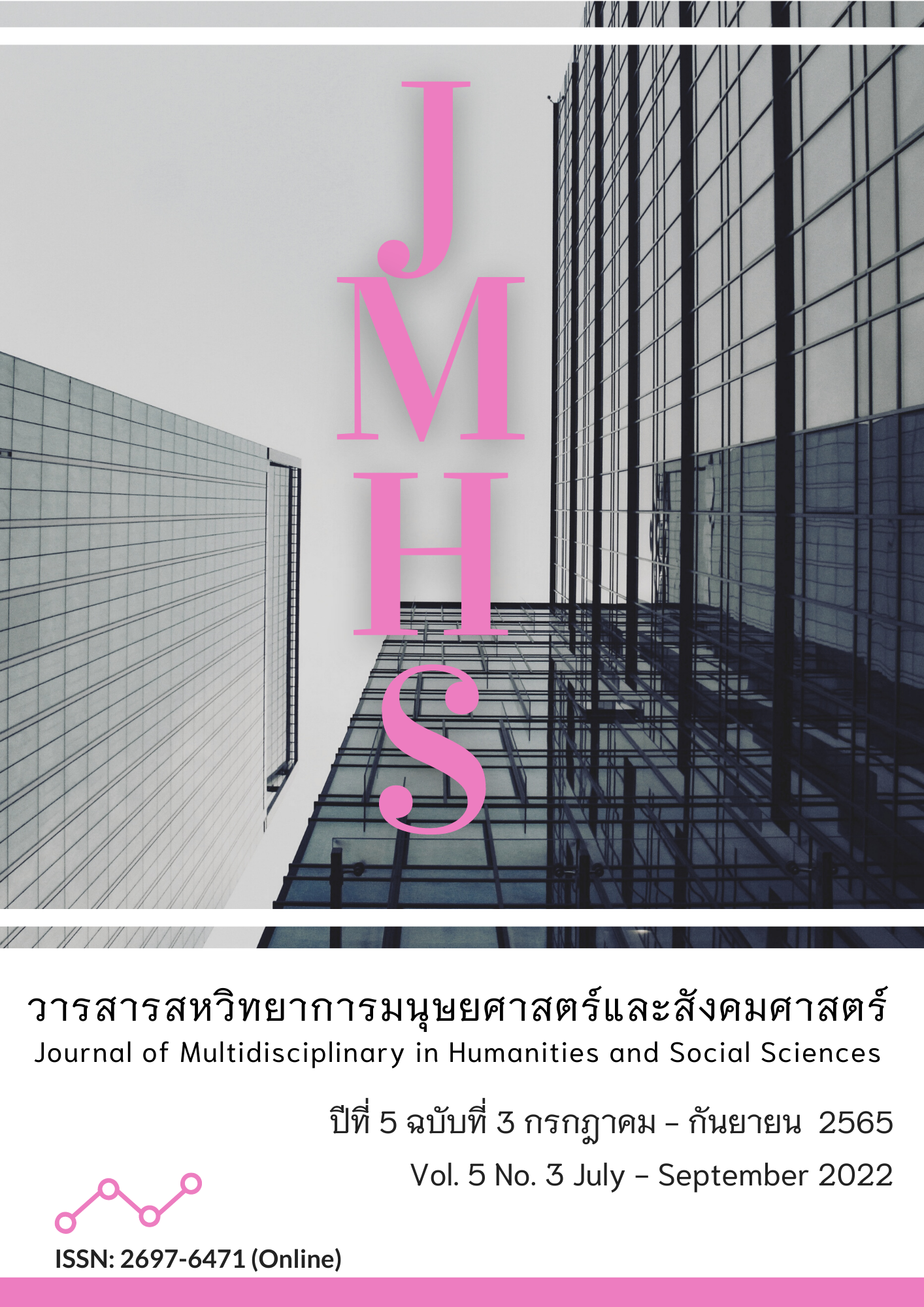Value Chain Model for Value Addition of Local Ingredients to Gastronomy Tourism’s Activities in Phuket Province
Main Article Content
Abstract
A value chain is a business strategy that entrepreneurs or manufacturers can use to create value as an ingredient in the process of production. This academic article focused on the value chain model for the value addition of local ingredients to gastronomic tourism activities in Phuket. The value chain model drives the process of production through to the delivery process. The purpose was to add value to productivity, in the process, creating value, a competitive advantage and experiences for tourists. The value chain model for creating value from local raw materials for gastronomy tourism activities in Phuket consists of three processes: 1) Upstream management, which includes farm systems, product stories, creative industries, and sustainable tourism; 2) Middle Stream management, which includes logistics management, sales, and marketing; and 3) Downstream management, which includes, among other things, gastronomy tourism activities such as cooking classes, food festivals, and local food products.
Article Details

This work is licensed under a Creative Commons Attribution-NonCommercial-NoDerivatives 4.0 International License.
Views and opinions appearing in the Journal it is the responsibility of the author of the article, and does not constitute the view and responsibility of the editorial team.
References
กระทรวงการท่องเที่ยวและกีฬา. (2565). สถิติจำนวนนักท่องเที่ยว. สืบค้นเมื่อ 2 กุมภาพันธ์ 2565, จาก https://mots.go.th/more_news_new.php?cid=630
จรินทร์ อาสาทรงธรรม. (2560). ความรู้ในมุมมองนักบริหารรุ่นใหม่. กรุงเทพฯ: ซีเอ็ดยูเคชั่น.
จังหวัดภูเก็ต. (2560). แผนยุทธศาสตร์ Phuket : City of Gastronomy 2560 – 2564. สืบค้นเมื่อ 2 กุมภาพันธ์ 2565, จาก https://www.phuket.go.th/webpk/file_data/gastronomy/01.pdf
ชัยภูมิ สุขสำราญ. (2563). ผลของวัสดุปลูกต่อการเจริญเติบโต และศักยภาพการผลิตผักลิ้นห่านในพื้นที่จังหวัดภูเก็ต. แก่นเกษตร, 48(3), 509-514. สืบค้นจาก https://li01.tci-thaijo.org/index.php/agkasetkaj/article/view/251254
ฐาปกรณ์ ทองคำนุช และคณะ. (2564). รูปแบบการเชื่อมโยงการจัดการห่วงโซ่อุปทานสินค้าเกษตรสู่ธุรกิจ โรงแรมและธุรกิจบริการในจังหวัดพระนครศรีอยุธยา. วารสารศิลปศาสตร์ราชมงคลสุวรรณภูมิ, 3(2), 118-132.
ทำนอง ชิดชอบ และ นลิน เพียรทอง. (2561). โมเดลความสัมพันธ์เชิงสาเหตุของแรงผลักดันการจัดการโซ่อุปทาน สีเขียวและผลการดำเนินธุรกิจของอุตสาหกรรมการผลิตในประเทศไทย: การทบทวน วรรณกรรม. วารสารการจัดการยุคใหม่, 16(2), 127-140.
นภชนก ตลับเงิน และ พฤฒิยาพร มณีรัตน์. (2563). อัตลักษณ์อาหารท้องถิ่นของการท่องเที่ยวโดยชุมชนในจังหวัดภูเก็ต. การประชุมวิชาการระดับชาติ “คุณภาพของการบริหารจัดการและนวัตกรรม” ครั้งที่ 6. มหาวิทยาลัยการจัดการและเทคโนโลยีอีสเทิร์นอุบลราชธานี.
นิมิต ซุ้นสั้น และ อุมาภรณ์ สมกาย. (2564) ประสบการณ์การท่องเที่ยวเชิงอาหารที่ส่งผลต่อการแบ่งปัน ประสบการณ์: การศึกษาตัวแปรส่งผ่านและตัวแปรกำกับ. จุฬาลงกรณ์ธุรกิจปริทัศน์, 43(3), 40-63. DOI: 10.14456/cbsr.2021.11
เบญจมาภรณ์ ชำนาญฉา. (2561). การท่องเที่ยวเชิงอาหาร: ศักยภาพและความได้เปรียบของประเทศไทย. วารสารสมาคมสถาบันอุดมศึกษาเอกชนแห่งประเทศไทย ในพระบรมราชูปถัมภ์สมเด็จพระเทพรัตนราชสุดาฯ สยามบรมราชกุมารี, 24(1). 103-116.
พรรณี สวนเพลง และคณะ. (2559). การท่องเที่ยวเชิงอาหาร: รายงานภาวะเศรษฐกิจท่องเที่ยว. สืบค้นเมื่อ 8 กุมภาพันธ์ 2565, จาก https://sean.psu.ac.th/data/tourism/topic21/Gastronomy_ Tourism_TH2559.pdf
ภาณุวัฒน์ ภักดีอักษร และ ปทุมมาลัย พัฒโร. (2564). การวิเคราะห์ปัจจัยองค์ประกอบเชิงสำรวจของแรงจูงใจนักท่องเที่ยวต่างชาติเพื่อการท่องเที่ยวเชิงอาหารในจังหวัดภูเก็ต ประเทศไทย. วารสารมนุษย์ศาสตร์วิชาการ, 28(2), 1-27.
ฤธรรมรง ปลัดสงคราม. (2561). การออกแบบอัตลักษณ์บนบรรจุภัณฑ์สำหรับวิสาหกิจชุมชนผลิตภัณฑ์ สับปะรดภูเก็ต จังหวัดภูเก็ต. สารอาศรมวัฒนธรรมวลัยลักษณ์, 18(1), 1-17.
เสาวพรรณ ปาละสุวรรณ และ คณะ (2563). การพัฒนาบะหมี่สดเสริมผักเหลียง. วารสารวิจัยรำไพพรรณี, 14(1), 167-170. สืบค้นจาก https://so05.tci-thaijo.org/index.php/RRBR/article/view/240491
อมรศรี แซ่ตัน. (2563). การใช้บริการอาหารพื้นถิ่นของผู้บริโภค จังหวัดภูเก็ต(วิทยานิพนธ์หลักสูตร คหกรรมศาสตรมหาบัณฑิต). มหาวิทยาลัยเทคโนโลยีราชมงคล วิทยาเขตพระนคร.
Dapiran, G. P., & Kam, B. H. (2017). Value creation and appropriation in product returns management. The International Journal of Logistics Management, 28(3), 821-840. https://doi.org/10.1108/IJLM-11-2015-0199
Haven-Tang, C., Thomas, A. J., & Fisher, R. (2022). To What Extent Does the Food Tourism ‘Label’ Enhance Local Food Supply Chains? Experiences from Southeast Wales. Tourism and Hospitality, 3(1), 153-160. https://doi.org/10.3390/tourhosp3010011
Irwansyah, D. (2018). Measurement of Study Productivity and Evaluation Analysis by using the American Productivity Center (APC) Model at a Palm Oil Factory (Pks PT. Syaukath Sejahtera). In Proceedings of MICoMS 2017. Emerald Publishing Limited.
Jeon, M. M., & Jeong, M. (2017). Customers’ Perceived Website Service Quality and Its Effects On E-Loyalty. International Journal of Contemporary Hospitality Management, 29(1), 438-457. https://doi.org/10.1108/IJCHM-02-2015-0054
Kemitare, G., Kabuye, F., Olyanga, A. M., & Rudaheranwa, N. (2020). Value Chain, Productivity and Trade Performance in The Dairy Industry. Modern Supply Chain Research and Applications, 3(1), 24-40. https://doi.org/10.1108/MSCRA-05-2020-0009
Kotler, P. (2013). Marketing Management (The Millennium Edition). New York: Prentice Hall.
Porter, M. E. (2004). Competitive Advantage: Creating and Sustaining Superior Performance. New York: Simon & Schuster.
Porter, M. E. (1985). Competitive Advantage: Creating and Sustaining Superior Performance. New York: The Free Press.
Rahmiati, F., Othman, N. A., Ismail, Y., Bakri, M. H., & Amin, G. (2020). The Analysis of Tourism Value Chain Activities on Competitive Creation: Tourist’s Perspective. Talent Development & Excellence, 12(1), 4613-4628. https://doi.org/10.13106/jafeb.2020.vol7.no12.959
Tinta, A. A. (2017). The Determinants of Participation in Global Value Chains: The Case of ECOWAS. Cogent Economics & Finance, 5(1), 1389252. https://doi.org/10.1080/23322039 .2017.1389252


